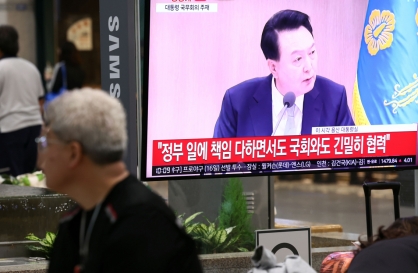[Hal Brands] Chinese money has American universities in a bind
By BloombergPublished : Dec. 16, 2018 - 17:17
 The arrest of Huawei’s chief financial officer, Meng Wanzhou, in Canada at the request of the US has further ramped up the tension and rancor between Washington and Beijing. It is also forcing a reckoning about the role of Chinese money in America.
The arrest of Huawei’s chief financial officer, Meng Wanzhou, in Canada at the request of the US has further ramped up the tension and rancor between Washington and Beijing. It is also forcing a reckoning about the role of Chinese money in America.Members of the Twitterverse have begun to point out that certain US think tanks have accepted money from Huawei, which the US government considers to be linked to China’s intelligence apparatus. Yet they are not the only academic and research institutions that need to think seriously about their relationship with China these days. The trick in addressing these dilemmas will be to hedge against real dangers without adopting knee-jerk anti-China policies.
Since the founding of the People’s Republic of China, the allure of its market has enticed Americans. And since the Chinese-American rapprochement and China’s economic opening in the 1970s and 1980s, it has been seen as something of a promised land for US educational institutions. Universities have courted donors among China’s nouveau riche. Chinese students have poured into US educational institutions. Some of America’s elite universities have opened physical campuses in China.
The creation of those campuses has long stirred worries about academic freedom: Universities can promise to protect open debate and inquiry in the classroom, but they can’t do much to ensure that students won’t be intimidated or punished outside it for expressing politically incorrect opinions. Yet, so long as China seemed to be moving in the right direction -- toward greater economic and, eventually, political openness -- deepening linkages between China and American universities were generally thought to be a good thing.
The thinking went like this: Opening campuses in China would expose Chinese students to American ideas and traditions of intellectual freedom; attracting Chinese students to the US would accomplish the same purpose; the opening of Confucius Institutes -- organizations that exist at least nominally to promote the study of Chinese culture and language on US campuses -- would deepen American knowledge about this important emerging power.
However, reporting indicates that the Chinese government is using its sponsorship of Confucius Institutes to promote pro-Chinese propaganda on US campuses. There are worrying reports that Chinese students in the US are being spied on by other Chinese students. Concerns have emerged about whether Chinese students and researchers are using their access to labs and research centers to steal valuable intellectual property.
Finally, the sharp downturn in US-China relations has made it natural to ask whether reliance on Chinese money or students may create more vulnerabilities than strengths. At its sharpest, this criticism suggests that if US universities are addicted to Chinese money, they will have trouble serving American interests.
These concerns have led to some severely misguided ideas, the most extreme of which is banning Chinese students from US campuses. It would deprive the US of the ability to influence Chinese students who come here to study by exposing them to new perspectives and ideas. It would hurt universities financially and erode the intellectual, economic and soft-power advantages the US derives from its unparalleled higher-education system.
US universities do need to think harder about how to deal with China. It is, after all, an increasingly hostile power that has no compunction about using the openness of democratic societies against them, and that has engaged in intellectual property theft.
The American Association of University Professors has called on US universities to stop signing secret agreements with Confucius Institutes, and to close those institutes unless the host university has unilateral control over the academic activities and can ensure the academic freedom of those who teach in them. As distasteful as it might seem to some academics, there is probably a case for better consultation between universities and US law enforcement and intelligence regarding how to protect intellectual property and prevent Chinese military officials from gaining access to valuable information by disguising themselves as independent researchers.
Universities also need to guard against the potential risks posed by taking Chinese money. At the very least, this means being more transparent about how much Chinese money they are receiving and what the sources are, and resolutely resisting any donor efforts to attach political or intellectual strings to gifts.
Additionally, American universities should consider how they would cope if they could no longer enroll Chinese students. The Chinese government could easily restrict the flow of students in hopes of gaining an advantage in an escalating trade war.
Finally, US universities with campuses in China need to be staunch defenders of freedom of expression. If Chinese officials are limiting freedom of expression or otherwise interfering in the academic mission of those institutions, then those practices need to cease or those campuses need to close.
All of these adjustments will involve some pain for an academic community that has long seen China as an attractive partner rather than a geopolitical enemy. But the sooner US universities start protecting themselves in smart ways, the better they can resist the more extreme measures that would do more harm than good.
Hal Brands
Hal Brands is a Bloomberg Opinion columnist, the Henry Kissinger distinguished professor at Johns Hopkins University’s School of Advanced International Studies, and senior fellow at the Center for Strategic and Budgetary Assessments. -- Ed.
(Bloomberg)






![[From the Scene] Monks, Buddhists hail return of remains of Buddhas](http://res.heraldm.com/phpwas/restmb_idxmake.php?idx=644&simg=/content/image/2024/04/19/20240419050617_0.jpg&u=20240419175937)







![[From the Scene] Monks, Buddhists hail return of remains of Buddhas](http://res.heraldm.com/phpwas/restmb_idxmake.php?idx=652&simg=/content/image/2024/04/19/20240419050617_0.jpg&u=20240419175937)

![[KH Explains] Hyundai's full hybrid edge to pay off amid slow transition to pure EVs](http://res.heraldm.com/phpwas/restmb_idxmake.php?idx=652&simg=/content/image/2024/04/18/20240418050645_0.jpg&u=20240419100350)

![[Today’s K-pop] Illit drops debut single remix](http://res.heraldm.com/phpwas/restmb_idxmake.php?idx=642&simg=/content/image/2024/04/19/20240419050612_0.jpg&u=)